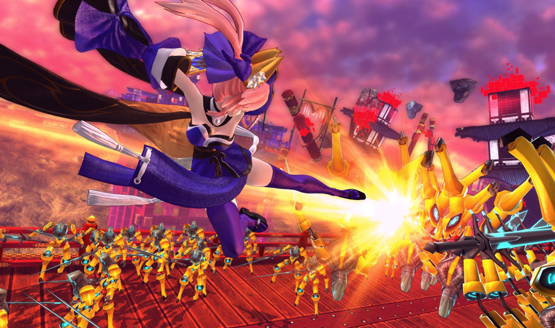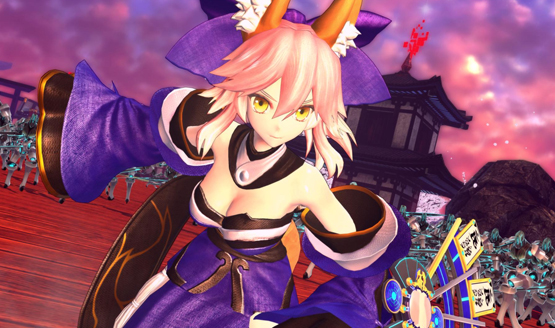Okay I’ll admit it, I’ve actually played and enjoyed a Dynasty Warriors game. *Whew* I feel so much better getting that off my chest. Now don’t get me wrong; there is plenty wrong with the series on a fairly fundamental level. However, I find that there is something insanely gratifying about mowing through hordes of adversaries in a single swing of a glaive. So as you might imagine, when the upcoming release of Fate/Extella: The Umbral Star was described to me as “Dynasty Warriors on speed,” you best believe that my interest was piqued.
New Beginnings
For those that are not familiar with the Fate franchise, don’t feel too bad. The heavily anime-inspired series has primarily been chained to mobile platforms (PlayStation Portable and iOS), consisting of a couple fighting games, a dungeon crawler, and an RPG. To make matters even more confusing, at least in North America, the brand has released installments under four separate publishers. So when the game made the transition from fighting game to “horde hacker,” it seemed like par for the course, for a series that has been consistently attempting to reinvent itself with each installment.
The campaign of Fate/Extella: The Umbral Star revolves around a singular core character that is supported by one of 16 additional “servant” characters. It’s important to note that rhe term “servant” is actually the game’s term, not mine, because it actually ties directly into the narrative of the campaign. Essentially these complementary combatants are permutations on one of eight different classes. While in combat, you can switch back and forth between the main and pre-selected servant character, in order to best dispatch the adversaries at hand.

A Never-Ending Story
The narrative picks up directly following the events of 2010’s Fate/Extra. The Holy Grail War has finally come to an end and the leader of the victorious faction, Nero, is trying to regather control of her territories. Unfortunately, due to the unrest brought about by the conflict, another powerful group has started to gather traction of their own. This newly emerging faction has joined together in an effort to try and usurp the throne. The core storyline will then bat around between a rogue’s gallery of different characters, while trying to build out the surprisingly massive narrative.
For a game that leans heavily on the “mindless hack-a-thon” gimmick, it’s shocking how much thought has been put into the dialog squeezed between each mission. Hell, they even attempt to provide the player with the illusion of branching conversation trees. However, despite its sprawling nature, be prepared to churn through page after page of translated dialog. Oh, and for the presentation purists out there, there is no English dialog track, so get ready to read until your corneas want to throw in the towel.
As much as I love a deep story, there was just something at the core of Fate/Extella that couldn’t get its hooks into me. It was both hard to follow and in many cases completely nonsensical. The relationship between the master and servants made very little sense, especially when considering that in many cases the individuals acted as if the roles were completely reversed. I am not sure if this is some sort of a cultural disconnect, but regardless, I found myself lost and confused a great majority of the time. This is disappointing considering that a significant amount of the campaign runtime is dedicated to exposition. Ultimately, most everything ends up falling flat. It is hard to say if this was also the fact in the game’s original tongue, but there certainly seems to be something that was lost in translation.
[imagebrowser id=4421]
Brainless Brawling
As I alluded to earlier, the core battle mechanics and level structure are very reminiscent of a Dynasty or Samurai Warriors game. Be ready to stave off waves of randomly spawning enemies, heaving themselves in your general direction. I only say “heaving,” because unless you’re referring to boss characters, calling it an attack is generous at best. I can only assume that the overall lack of challenge is due to AI limitations, which can be especially tricky when they are rendering vast crowds of models on screen at one time. However, the fact still remains that there is little to no challenge when facing off against the base-level underlings.
Probably the most entertaining part of the fighting systems in Fate/Extella would have to be the constantly shifting scoreboard. The core focus of each match is capturing the most zones on the map. As you begin to clear out enemies from a given sector, you are then be granted control of its battle units. Once an area has been claimed, you then move on to another adjoining sector and attempt the same process again. Wash. Rinse. Repeat. Once either team reaches the target number of battle units, the mission is over.
There is a perpetual give and take to advancing your troops into a new sector. When bouncing around the map, AI characters are left behind to protect your existing territories. As anyone whose ever depended upon an AI already knows, each units effectiveness is inconsistent at best. Backtracking to regain control of a given segment of the map is a routine occurrence that will once again open up other areas to attack. Despite it sounding a bit monotonous when described it text, the strategic nature of the player’s choices helps to keep things fresh and exciting. However, this constantly shifting balance does make it difficult to determine how long a given match will last. Depending upon the effectiveness of your attack plan, the dramatically shifting effectiveness of your AI counterparts and the aggressiveness of the opposition, matches can range in time from ten minutes on the low end to just shy of an hour on the opposite end of the spectrum.
Though matches feature plenty of exciting moments, there are far more moments spent combo-ing poor cannon fodder to hell and back. Hack, hack, slash, slash, hack…you get the drift. Every encounter boils down to switching back and forth between a heavy and standard attack, while mixing in a screen-clearing super move from time-to-time. This is where the game’s outstanding animations take center stage. Even when performing a chain for the eightieth time in a row, there is still something about the finely polished presentation that keeps things fresh and entertaining.
I am fully willing to admit that I approached Fate/Extella: The Umbral Star with lower expectations than I probably should have. With limited knowledge of the franchise, it was hard to predict what the game had in store. This is why it was such a pleasant surprise when it turned out to be an extremely competent brawler, with a shockingly expansive, albeit slightly disjointed, core campaign. Despite its narrative shortcomings, the moment-to-moment combat is fast paced, visually arresting and extremely entertaining. If you are looking for a fun mindless jaunt to kick off the New Year, look no further.
Review code for Fate/Extella: The Umbral Star provided by publisher. Reviewed on PS4. For more information on scoring, please read our Review Policy here.
-
Bright vibrant art style
-
Fast paced action keeps things from getting to monotonous
-
Far more exposition that you would expect
-
Fairly limited variety of enemy character models
-
Recapturing zones continuously grows old, fast
-
The story doesn't really make sense without prior knowledge of the series.









